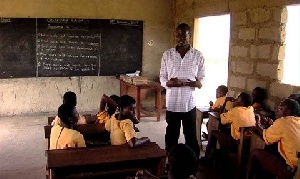 The Free SHS policy was one of President Akufo-Addo's major campaign promises
The Free SHS policy was one of President Akufo-Addo's major campaign promises
Government has been urged to motivate teachers and provide them with the necessary teaching materials so they can deliver their best by contributing their quota to the success of Free Senior High School Policy.
Director in charge of Girls Education Unit at the Ghana Education Service Catherine Nutsugah-Mikado made the call in an interview on the sideline of the 20th anniversary celebration of the Unit in Accra last Friday.
She lauded government for the implementation of its flagship Free Senior High School Policy and its commitment towards its sustenance in order to see more children in school. She, however, wants government to focus more attention on the quality of the policy by providing the necessary teaching and learning materials to motivate teachers to deliver their best.
The free SHS policy had been a major promise by President Akufo-Addo during the run-up to the 2012 and 2016 general elections. It was officially launched by the president on Tuesday, September 12, 2017.
About 400,000 students are expected to benefit from the education policy that will exempt them from paying tuition and other fees. Mrs. Nutsugah-Mikado was optimistic the programme will offer many children, especially girls the opportunity to get enrolled into Senior High Schools to further their studies to the highest level in order to become productive and contribute their quota to the development of the nation.
“The free SHS policy in itself is indeed a very big intervention for the girls because we know that many girls make the grade but they’re not able to progress in education but with this free education policy, I hope and I know more girls would get the opportunity to enter secondary education,” she stated.
The Girls’ Education Unit (GEU) of the Ghana Education Service was an initiative of the Free Compulsory Universal Basic Education (FCUBE) policy established by government in 1997 with the mandate to ensure the bridging of gender gaps in pre-tertiary education, be it access, performance, completion and achievements.
With the drive to increase the enrolment of girls in basic education to equal that of boys, developing and maintaining strategies aimed at ensuring the continuation of girls from the basic to secondary education as well as developing programmes to enhance the social capital of girls among others, the Unit has performed remarkably contributing massively to the country’s meeting of its MDG Goal 3A target in the past through ensuring gender parity at the primary school level in 2014/15.
As a result, female enrolment at Junior High School (JHS) level increased from 611,276 students in 2009/10 to 783,638 students (783,638) in 2015/16 which represented an increase in Net Enrolment Rate (NER) from 45.0% to 49.6%. It has also significantly improved the Gross Enrolment Rate (GER) from 76.3% in 2009/12 to 86.7% in 2015/16 including causing the GER gender gap in favour of boys decreased from 6.2% in 2009/10 to 2.6% in 2015/16.
It must be emphasized that great initiatives are always accompanied by challenges and if surmounted can lead to success, just as in the case of the GEU. But assessing the overall performance of the GEU in terms of its achievements since inception 20 years ago, Mrs. Nutsugah-Mikado maintained her outfit has performed creditably to see more girls enrolled in schools as compared to boys in equal proportion with support from government and its stakeholders including some local and international NGOs in the country.
“We’ve achieved a lot because these days a lot of girls are in school. Some have really made it and have been able to progress with tertiary education including others who have been able to occupy top positions.”
She therefore commended the DFID, UNICEF, Camfed, Planned Ghana and other local NGOs in the country for complementing government’s effort to the success of the FCUBE policy including other interventions enrolled by government to ensure quality and equality thrive in education of children, particularly girls.
According to her, the Unit has done its best in terms of awareness creation about the need for more girls to be in school but the issue about the sustainability of policies is militating against their inability to reach communities where most girls are still believed to be under suppression; not to attend school.
She added although her outfit has implemented quite a number of good strategies to achieve result, lack of resources has also been the bane hampering the expansion of the programmes.
She therefore called on all stakeholders to come on board and support the free SHS policy to work including other targeted interventions, adding “it’s critical in dealing with the situation”. Mrs Ntsugah-Mikado strongly advocates for the establishment of clear-cut policies and guidelines on gender and education that will regulate re-entry of teenage mothers back to school.